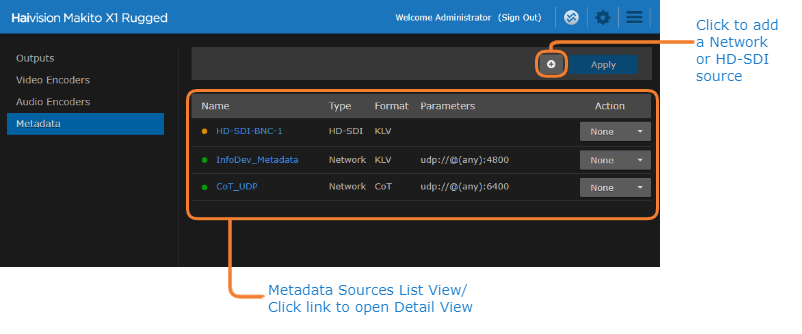Configuring Metadata Capture
From the Metadata pages, you can configure the Makito X1 to capture either KLV (Key Length Value) or CoT (Cursor on Target) metadata and then incorporate data information within the metadata elementary stream of the standard MPEG Transport Stream.
You can set up multiple metadata inputs to include in Transport Streams. The Makito X1 supports the following metadata input types:
Input Type | Description |
|---|---|
SDI | The Makito X1 extracts KLV metadata packets from the HD-SDI interface as per MISB RP 0605.2. See Configuring HD-SDI Metadata Sources. |
Network | The Makito X1 captures metadata from a user definable network port (up to eight UDP inputs). The encoder can receive either (a) KLV payload encapsulated in UDP or (b) CoT inside UDP that is converted to KLV and then streamed. See Configuring Network Metadata Sources. |
Serial port | The Makito X1 Rugged extracts either KLV or CoT metadata packets from the COM1 serial port. See Configuring Serial Metadata Sources. |
The Makito X1 auto-detects the hardware setup of the encoder. SDI metadata sources are created automatically at startup by the system. UDP sources must be manually created by the user. The Makito X1 supports insertion of multiple metadata sources into the same KLV Elementary Stream.
The Makito X1 supports both synchronous and asynchronous KLV metadata stream signaling and AU (Access Unit) transport support. When configuring an (Output) stream, you can select the encapsulation type to use for the associated KLV metadata source.
CoT/UDP and CoT/Serial metadata sources can also be re-transmitted to other IP destinations for follow-up analysis by third party systems. For more information, see CoT Retransmission.
You can define a small set of static KLV objects (i.e., mission IDs and security classification) for KLV and CoT metadata sources. For more information, see KLV Metadata Insertion.
Metadata List View
To open the Metadata List View:
On the Streaming page, click General Settings on the navigation bar and Metadata on the sidebar.
The Metadata List View opens, displaying the list of defined Metadata sources for the encoder. One SDI metadata source is provided by default.The Metadata List View displays the Status LED, source Name, Type, Format, and selected Parameters for each source.
From here, you can perform the following tasks:
To view or modify source details, click a link in the table to open the Metadata Detail View.
To add a Network or HD-SDI source, click the
 Add button.
Add button.To change the status for a source, click the drop-down list under Action and select either Start or Stop (as applicable). You can also delete a Network source.
To apply your changes, click Apply.

